By Warren Nunn
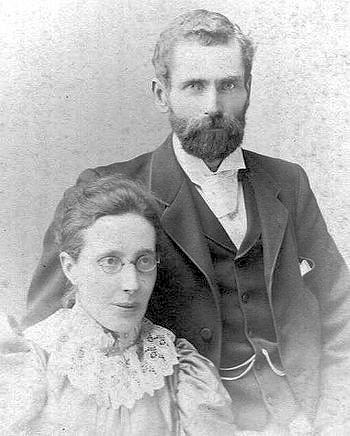
Ellen Jane Watt and Alexander Silver of Harvieston Farm.
When Alexander Silver and Helen (Ellen) Jane Watt married in March 1894, life changed drastically at Harvieston farm near Stonehaven, Aberdeenshire, Scotland.
It was a marriage forced on the 36-year-old Alex and 29-year-old Ellen by the fact she was pregnant. Alex’s mother had died a few months earlier and Ellen’s father in 1892.
Perhaps those emotional times brought them together but their families were close as Alex revealed in a letter about 18 months earlier to his younger brother James in Australia.
“We have taken for the summer’s grass a large haugh near Bervie, for which we pay £105 and have 48 cattle and horses in it. John Watt, my brother John and I were down at it last night and were highly satisfied with it.’’
That letter included references to a number of family members and friends including the passing of Ellen’s father, John Watt senior.
“Old Mr Watt of Hilton has passed away this spring. Really I never heard of so many deaths as there were here about last winter and spring.”
Ellen was moving into a house filled with Silver family members including Alex’s older brother John and youngest sister Isobel whom they called Bella.
Another sister, Helen, had married and was living in England while younger brother James had sailed off to Australia two years earlier.
On September 11, 1894 Ellen gave birth to Alexander junior and, 16 months later, to another son whom they named John Watt Silver.
Just over two years later, they welcomed a third son, James.
Thursday, 30 January 1902 was to be a dramatic day for the Silver family of Harvieston Farm when then three-year-old James set fire to the granary while playing with matches.
Two newspaper reports of the incident give the details but, briefly, the fire caused about damage estimated at 2000 pounds which included the loss of animals and an expensive threshing mill.
There was a break of a couple of years before daughter Helen Jane added to Alex and Ellen’s brood.
Tragic 10 days
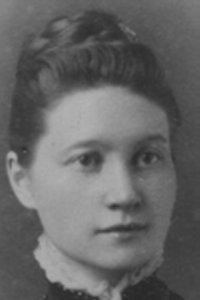
Ellen Watt
A year or so later Ellen fell pregnant again, this time with twins. When came the time for her to deliver, 18-month-old Helen was deathly ill with whooping cough.
January 1905 was to be the start of more than a decade of pain for the Silver family.
On Tuesday, January 10th Ellen gave birth to two sickly babies William Arthur and Isabella Ada Watt. Ellen, too, was barely alive but Dr Charles Aymes spent countless hours tending to her and the babies.
Over the next 10 days, tragedy was to follow tragedy at Harvieston Farm. Two days after giving birth, Ellen passed away at 11.55am. Just seven hours later newborn William died leaving the family in further distress.
The grief that overwhelmed the family that day was heightened within 24 hours when 18-month-old Helen succumbed to whooping cough on the Friday at 7am.
In the following days, Isabella grew weaker and a week later, at 4.45pm on Friday the 20th, she too passed from this earth. In 10 days, four members of the family were dead.
John and Bella were naturally caught up in the emotion and it fell to John, whom they called Jack, to organise the funerals.
Bella, almost 45 and single, two months later married a 57-year-old widower John Duncan, a brother of Alex Duncan who was married to her sister Helen.
Alex was numb; the grief he felt ran so deep that he turned to a bottle of whisky for comfort. Over the next two and a half years, he descended into a deep alcoholic haze that ended on 19th August 1907 when he died nine months short of his 50th birthday and only a few months after another interesting event at Harvieston.
DNA connection to illegitimate child
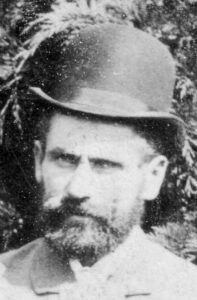
Sandy Silver.
On April 14, 1907, an illegitimate child named Jessie Silver Fenton, was born there to Jessie Fenton whose occupation was given as housekeeper (see birth certificate below).
No father’s name is recorded but there is now no doubt that one of the males in the Harvieston Farm was the child’s dad.
There is a proved DNA connection between Silver descendants and Jessie Silver Fenton descendants.
It seems logical to presume Sandy Silver fathered the child given he had lost his wife and had been drinking himself to death.
His brother John is less likely to have been involved with a woman outside of marriage; although that scenario is not impossible.

Jessie Silver Fenton’s birth certificate which reveals the mother’s usual place of residence as Blackburn Mearns, Tannadice which is in Dundee. In 1901, she was a housekeeper at Cheyne Farm, near Stonehaven, just a few miles from Harvieston Farm.
Just how the surviving three boys – Alex, John and James – handled all the trauma is hard to fathom. Again, it fell to their uncle Jack to care for them.
Gave their lives as Gordon Highlanders
The Silvers eventually left Harvieston as both John and Alex were students at university. They both served with the Gordon Highlanders and fell in battle.
On the university’s In Memoriam page (the link to which is now defunct), there is this tribute to Alex (pictured).
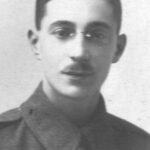
Alex Silver.
Son of Alexander Silver; born Harvieston Farm, Kinneff, 14 September 1894 ; educated Gordon’s College ; entered Aberdeen University to study Agriculture in 1912. At the outbreak of war he went with “U” Company to Bedford where he became a great favourite not only with his fellow-students but throughout the Battalion. Cooking for a company was no “catch” in those days, but “Sandy” cheerfully accepted the job with all the drudgery it entailed. In this capacity he left with the Battalion for France in February 1915. It did not take long under active service conditions to show that there was the real fighting stuff in Silver. After repeated attempts he got relieved of the job which afforded him comparative safety. Alongside his old fellow-students in the trenches, he was supremely happy. Hardships seemed less real when Silver shared them. He took part with the company in the attack from Sanctuary Wood (Hooge) on 25 September 1915 and was subsequently posted as missing.
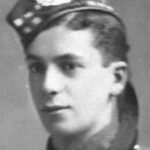
John Watt Silver.
And the website also has this tribute to John:
Son of Alexander Silver ; born Kinneff, Kincardineshire, 15 July 1896 ; educated Gordon’s College ; student in Arts, 1913-14. In May 1913 Silver joined “E” Company of the 4th Battalion Gordon Highlanders and was mobilized, August 1914, as a Private, After training he proceeded to France, where he served for a year. Silver then returned home, and entered the Cadet School, Gailes, to train for a commission, and in January 1918 was gazetted 2nd Lieutenant, Gordon Highlanders. He crossed to France in September, but his service was brief, for after six weeks he was killed in action at Douchy, 26 October 1918.
A few days later Bella Silver penned these sad words to brother James in Australia:
“We have had rather sad news to tell you this day week we had a wire from James Silver that John was killed in action on 25th of Oct. He had only been out about two months and I had a letter from him that he was getting on A1. I couldn’t tell you how sorry we are about him and we haven’t had a good night’s sleep since we heard but we must not grieve; he and Alex too have died nobly for their king and country. I just feel a little sore when I think it was so near the end of the war. But I will soon be looking forward to meeting them in a far better country. Poor James is feeling it very much and he was always afraid John would never come back and he would be left alone. John was 22 and there will not be any fear about James being called up I think.”
James, known as Jim, was 20 and the only surviving member of a family of six children. It is not known if he followed his brothers into Aberdeen University but it seems unlikely because he and his Uncle Jack made a decision to leave Scotland and follow James Silver to Australia.
In correspondence between Silver descendants and first cousins George Robertson (b. 1894, a son of Isabella Silver Robertson) and James Silver (b. 1890 the son of James Silver (Isabella’s brother) and Ann Findlay), George makes reference is the Harvieston Silvers:
“There were other Silver cousins. They were Alex, John, and James and Isabel. These were successful farmers of Havieston just south of Stonehaven. When Alex died, John came to visit my mother on departure to Australia, probably with his nephew Alex (Not sure who this Alex is. It may be from his mother’s side of the family, the Watts). (nothing more ever heard of them). James was a joiner and went to Australia as also did the third son, James, of Alex (above) who, just about 1919 followed his uncle Jim out to Australia. I hope this is clear. Isa Silver above, you see, had the same name exactly as my mother. She remained single a long time but lately married an old forester named Duncan of Banchory.”
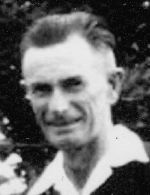
James (cousin Jim) Silver.
NOTES: The nephew James Silver mentioned went to Australia and died in Queensland in 1973. In his letter, George Robertson also makes reference to Alex and John’s success as farmers (that would be at Harvieston) and to them overindulging in alcohol:
“Now Alex and John after doing well dropped back by, having too successful a time, did, I think, become too fond of a dram. I remember at our grandpa’s funeral they arrived at Sunnyside in a coach and horses. And believe me, few farmers at that time (about 1902) possessed such luxuries. I then was 7 or 8 yrs. and had walked 5 miles to Sunnyside. And then walked to the church yard (two miles) — got so tired walking behind the cortege that I sat down at the side of the road in a ditch — in fact, went on strike. The Silver coach or carriage drew up beside me and took me aboard. This was my first experience of travelling in state! Some of the Silvers ‘were nae sma drink’ you can see.”
Cousin Jim Silver
That correspondence confirms much of what is known about the tragic Silvers of Harvieston. What became of Jack is unclear but Bella’s 1918 correspondence starts with a reference to having received a letter from him.
Young Jim Silver found his way to Queensland where he kept in contact with his uncle James Silver who had made his living as a builder in south-western Queensland.
James and his wife Janet had four children; Bella, Jack, Eva (whose twin, Nettie, died at 23 months) and James. Another child, Grace, had died as a two-year-old.
The newly arrived James Silver was known as cousin Jim, probably to distinguish him from his namesake uncle. He did not marry and worked as a farm hand on a number of properties.
A keen cricket follower, Jim liked to make the trip to Brisbane for Test matches at the ‘Gabba where he’d meet up with his cousin Jack Silver and Jack’s son Rob. Jack and Jim had met back in Scotland during World War 1 when Jack was serving in the Australian army.
Jim mostly worked for the Scott family at Beechmont in the Gold Coast hinterland. That was where he was to see out his days. He took ill and died at Southport Hospital in August 1973 aged 75.
